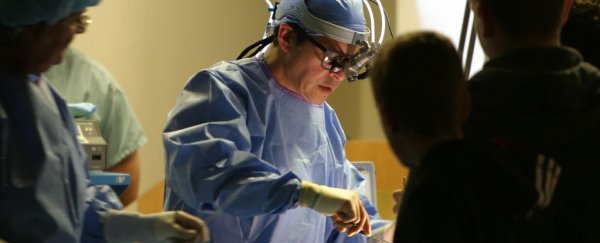Contaminated hormone extracts taken from human cadavers could be responsible for seeding the brain plaques associated with Alzheimer's disease, a new study has found.
While the process of deriving human growth hormone from cadavers was discontinued 30 years ago after being linked to the deadly Creutzfeldt–Jakob disease (aka the human version of 'mad cow disease'), the new research is significant because it constitutes the first tangible proof that amyloid pathology – the proteins that aggregate into brain plaques in Alzheimer's – is transferable between humans.
"This is the first evidence of real-world transmission of amyloid pathology, molecular neuroscientist John Hardy from the University College London in the UK, who was not involved with the research, told Alison Abbott at Nature. "It is potentially concerning."
It's important to clarify that the researchers aren't saying they have proof that Alzheimer's is transmissible between humans. But their finding that contaminated prion proteins can be transmitted in medical procedures may have grave implications.
As they write in their study, which is published in Nature:
"While there is no suggestion that Alzheimer's disease is a contagious disease and no supportive evidence from epidemiological studies that Alzheimer's disease is transmissible … our findings should prompt consideration of whether other known iatrogenic routes of prion transmission, including surgical instruments and blood products, may also be relevant to amyloid beta and other proteopathic seeds seen in neurodegenerative diseases. Amyloid beta seeds are known, like prions, to adhere to metal surfaces and to resist formaldehyde inactivation and conventional hospital sterilisation."
The researchers made their discovery when performing autopsies on the brains of eight people who died from Creutzfeldt–Jakob disease. While none of these patients (aged 36–51) showed clinical symptoms of Alzheimer's disease prior to their death, six of the eight brains showed evidence of amyloid pathology, and it was widespread in four. This suggests that they could have developed Alzheimer's disease if they'd lived longer.
As Abbot writes in Nature, the findings also raise the spectre that tens of thousands of people who had been treated with contaminated human growth hormone prior to 1985 could potentially be at risk of developing Alzheimer's. A 2013 study found that one in 2,000 people in the UK could carry the infectious prions that carry Creutzfeldt–Jakob disease.
While the implications of the research may cause alarm, other experts on neurodegenerative diseases are calling for calm.
"While the findings sound concerning, it's important to remember that human-derived hormone injections are no longer used and were replaced with synthetic forms since the link to CJD was discovered in the 1980s," Eric Karran, director of research at Alzheimer's Research UK, told Ian Sample at The Guardian.
"It's unusual for people of the ages studied in this research to have amyloid in the brain, but we don't know whether they would have gone on to develop Alzheimer's and there is currently no evidence that people who received human-derived growth hormone have a higher rate of the disease."
